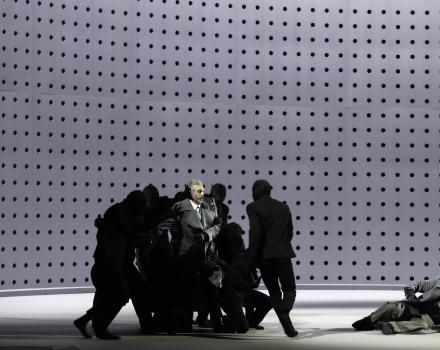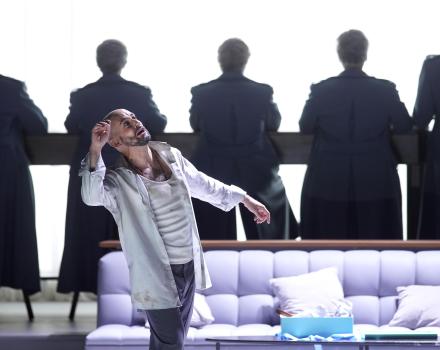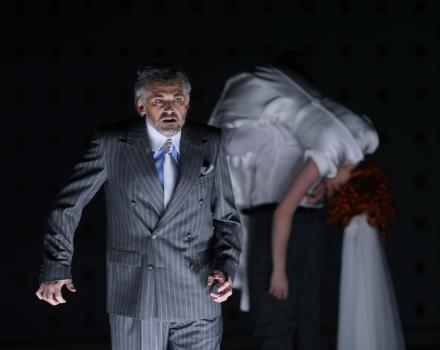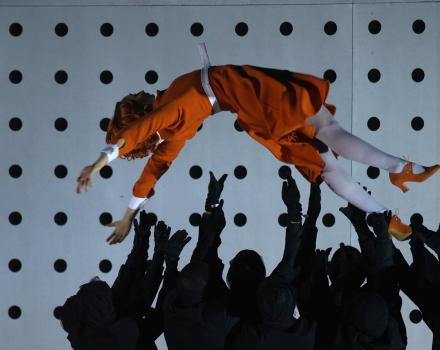
King Mitridate has left his empire in the care of his sons Sifare and Farnace while he is away at war. Deceived by a rumour of his father's death, Farnace declares his love to the King's betrothed, Aspasia. She seeks the protection of Sifare. Mitridate returns with Ismene as a bride for Farnace. When he hears of Farnace’s guilt, he determines to kill him. Will the ensuing intrigue of rivalry - in love and in politics - wind its way to a happy end?
In March 1770, the 14-year-old Mozart presented three magnificent arias at a soirée of Count Firmian’s in Milan: this led to his first commission, for an opera seria for one of Italy’s three principal theatres. The resulting opera Mitridate, re di Ponto has the advantage of being based on a great play - of the same name by Jean Racine. The same is true of Le Nozze di Figaro which he was to compose 15 years later. The tension in Mitridate is maintained throughout in a way that was impossible for tragedies of 18th-century origin with their genteel, rather bloodless behaviour. Unusually for Racine, nobody dies except the fierce old King; the Age of Enlightenment did like a happy ending. Acclaimed director, Claus Guth returns to Madrid to present this new production. For the premiere of this opera in the Spanish capital, Teatro Real has assembled an exceptional cast - among them Juan Francisco Gatell, Sara Blanch, Elsa Dreisig and Franco Fagioli - all well equipped for the vocal virtuosity of Mozart’s many arias, which get more and more beautiful as the opera proceeds.
CAST
|
Mitridate
|
Juan Francisco Gatell
|
|---|---|
|
Aspasia
|
Sara Blanch
|
|
Sifare
|
Elsa Dreisig
|
|
Farnace
|
Franco Fagioli
|
|
Ismene
|
Marina Monzó
|
|
Marzio
|
Juan Sancho
|
|
Arbate
|
Franko Klisovic
|
|
Orchestra
|
Teatro Real Orchestra
|
|
Chorus
|
Teatro Real Chorus
|
| ... | |
|
Music
|
Wolfgang Amadeus Mozart
|
|---|---|
|
Text
|
Vittorio Amedeo Cigna-Santi
|
|
Conductor
|
Ivor Bolton
|
|
Director
|
Claus Guth
|
|
Sets
|
Christian Schmidt
|
|
Costumes
|
Ursula Kudrna
|
|
Lights
|
Olaf Winter
|
|
Choreography
|
Sommer Ulrickson
|
| ... | |
VIDEOS
STORY
Mitridate has been defeated by the Roman general Pompey; the ageing King of Pontus had left his young fiancée Aspasia, already declared future queen, back home before setting off to war. Being suspicious of his sons, he has spread the rumour of his death in battle. Mitridate’s older son, Farnace, has immediately begun approaching Aspasia to ask her to marry him instead of his presumed-dead father.
Act 1
When Sifare, Mitridate's youngest son, arrives, Aspasia hopes that he will protect her against Farnace’s advances. Although Sifare is in love with Aspasia himself, he doesn’t want to pressure her.
Farnace is preparing for the marriage and his accession to the throne, but Sifare stops him. A fight is imminent when Mitridate’s confidant Arbate announces that the king is alive and will arrive shortly. The brothers decide to hide their quarrel and pretend nothing happened. Despite his love for Aspasia, Sifare is determined to be loyal to his father. Farnace, however, is secretly in league with the enemy. The Roman officer Marzio encourages him to confront his father.
Mitridate arrives together with the Parthian princess Ismene, whom Farnace was once in love with. Although he lost the battle, Mitridate is willing to continue his fight against Rome and has won Ismene’s father as an ally. He announces that Farnace is to marry Ismene, but she senses that she has lost Farnace’s love. In a private conversation Arbate tells Mitridate about Farnace’s attempt to snatch the crown and marry Aspasia. The king is relieved that Sifare, his favourite son, seems to be innocent. Knowing of Farnace’s sympathy for Rome, Mitridate is determined to punish his disloyal son.
Act 2
Ismene accuses Farnace of being unfaithful to her. When he admits to not loving her anymore and scorns her, she threatens to take revenge with the help of his father.
Mitridate promises Ismene that he will kill his own son, should he prove to be a traitor. He suggests that she marry Sifare instead, but Ismene still loves Farnace and doesn’t want his death. The king announces to Aspasia that their marriage will take place soon. She declares herself willing to obey the will of her father, who had arranged the marriage. Disappointed that she doesn’t love him, Mitridate calls for Sifare to join them. He then accuses Aspasia of being secretly in love with Farnace. The king warns her to be aware of his fury and pleads with Sifare to speak to her on his behalf.
Left alone, Aspasia confides in Sifare that she has always loved him, not his brother, but wants to save her honour and follow through with the marriage to his father. She asks him never to see her again. Sifare blames himself for having caused her sorrow by disclosing his love for her. He promises to leave her alone, even though this will make both unhappy. Aspasia is desperate; she doubts whether she will have the strength not to falter.
Mitridate has summoned his sons to a meeting in order to discuss military strategy. He asks Farnace to lead an army east towards Ismene’s home country and conquer more territories for her, whereas he himself would march west and besiege Rome itself. Sifare is ready to take over this daredevil task for his father whereas Farnace argues that Pontus would be left defenceless. Instead, Farnace suggests making peace with Rome and presents Marzio as an envoy willing to negotiate terms. Mitridate is furious to see a member of the enemy’s army in his own camp and sends him away. He has his son imprisoned, at which point Farnace reveals his brother to be the one Aspasia loves. He feels that if he is to perish, neither should Sifare be spared.
Mitridate orders Sifare to hide while he puts Aspasia to the test. When she arrives he pretends to step aside and let her marry his younger son. To Sifare’s horror, Aspasia confesses her love for him. Mitridate explodes in rage and swears to punish both severely. After Mitridate has left, Sifare again urges Aspasia to marry his father and save at least her own life. But she now dismisses this option: how could she marry the man who is about to kill the one she loves? They both wish to die together.
Act 3
Mitridate is ready to kill his two sons and his unfaithful fiancée alike. Ismene tries to assuage his wrath. Despite her own sorrow she is unwilling to take revenge on Farnace. Aspasia approaches the king. She will accept any punishment as long as Sifare’s life is spared. At that moment Arbate brings news that the Romans are attacking again. Before leaving for the battle where he might meet his own death, Mitridate orders both Sifare and Aspasia to be killed.
A servant brings Aspasia a poisoned drink. Just as she decides to swallow it, Sifare bursts in. Ismene has liberated him. He pleads with Aspasia to stay alive and rushes to join his father in battle, seeking his own death. Farnace, in turn, is liberated by Marzio who claims that Mitridate is either dead or captured and offers Farnace to become the new ruler of Pontus. Left alone, Farnace feels remorse for his treachery. Instead of joining the Romans he sets their fleet on fire.
Mitridate is brought back from the battlefield. In order to avoid captivity, he has wounded himself fatally. In agony, he acknowledges Sifare’s loyalty and asks him to marry Aspasia. Ismene testifies that Farnace fought for his country even though his former ally Marzio freed him from prison. Farnace is willing to return to Ismene and marry her. Reunited with his family, Mitridate dies while the survivors pledge never to give in to the Roman aggressors.
GALLERY




















